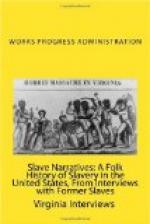“My mudders name wuz Jane Perry. Father’s name wuz Sid Jemison. Father died and William Perry was mudders second husband.
“My mudder wuz a Virginian and my father was a South Carolinian. My oldest brodder was named Sebron and oldest sister wuz Maggie. Den de next brudder wuz William, de next sister wuz named Artie, next Susie. Dats all of dem.
“De hol entire family lived together on the Cakhoba river, Perry County, Alabama. After dat we wuz scattered about, some God knows where.
“We chillun played ‘chicken me craner crow’. We go out in de sand and build sand houses and put out little tools and one thing and another in der.
“When we wuz all together we lived in a log hut. Der wuz a porch in between and two rooms on each side. De porch wuz covered over—all of it wuz under one roof.
“Our bed wuz a wooden frame wid slats nailed on it. We jus had a common hay mattress to sleep on. We had very respectable quilts, because my mudder made them. I believe we had better bed covers dem days den we hab des days.
“My grandmother wuz named Snooky and my grandfather Anthony. I thought der wasn’t a better friend in all de world den my grandmother. She would do all she could for her grandchildren. Der wuz no food allowance for chillun that could not work and my grandmother fed us out of her and my mudders allowance. I member my grandmudder giving us pot-licker, bread and red syrup.
“De furst work I done to get my food wuz to carry water in de field to de hands dat wuz workin’. De next work after dat, wuz when I wuz large enough to plow. Den I done eberything else that come to mind on de farm. I neber earned money in dem slave days.
“Your general food wuz such as sweet potatoes, peas and turnip greens. Den we would jump out and ketch a coon or possum. We ate rabbits, squirrels, ground-hog and hog meat. We had fish, cat-fish and scale fish. Such things as greens, we boil dem. Fish we fry. Possum we parboil den pick him up and bake him. Of all dat meat I prefar fish and rabbit. When it come to vegetables, cabbage wuz my delight, and turnips. De slaves had their own garden patch.
“I wore one piece suit until I wuz near grown, jes one garment dat we called et dat time, going out in your shirt tail. In de winter we had cotton shirt with a string to tie de collar, instead of a button and tie. We war den same on Sunday, excepting dat mudder would wash and iron dem for dat day.
“We went barefooted in de summer and in de winter we wore brogan shoes. Dey were made of heavy stiff leather.
“My massa wuz named Sam Jemison and his wife wuz named Chloe. Dey had chillun. One of the boys wuz named Sam after his father. De udder wuz Jack. Der wuz daughter Nellie. Dem wuz all I know bout. De had a large six room building. It wuz weather boarded and built on de common order.
“Dey hed 750 acres on de plantation. De Jemisons sold de plantation to my uncle after the surrender and I heard him say ever so many times that it was 750 acres. Der wuz bout 60 slaves on de plantation. Dey work hard and late at night. Dey tole me dey were up fore daylight and in de fields til dark.




